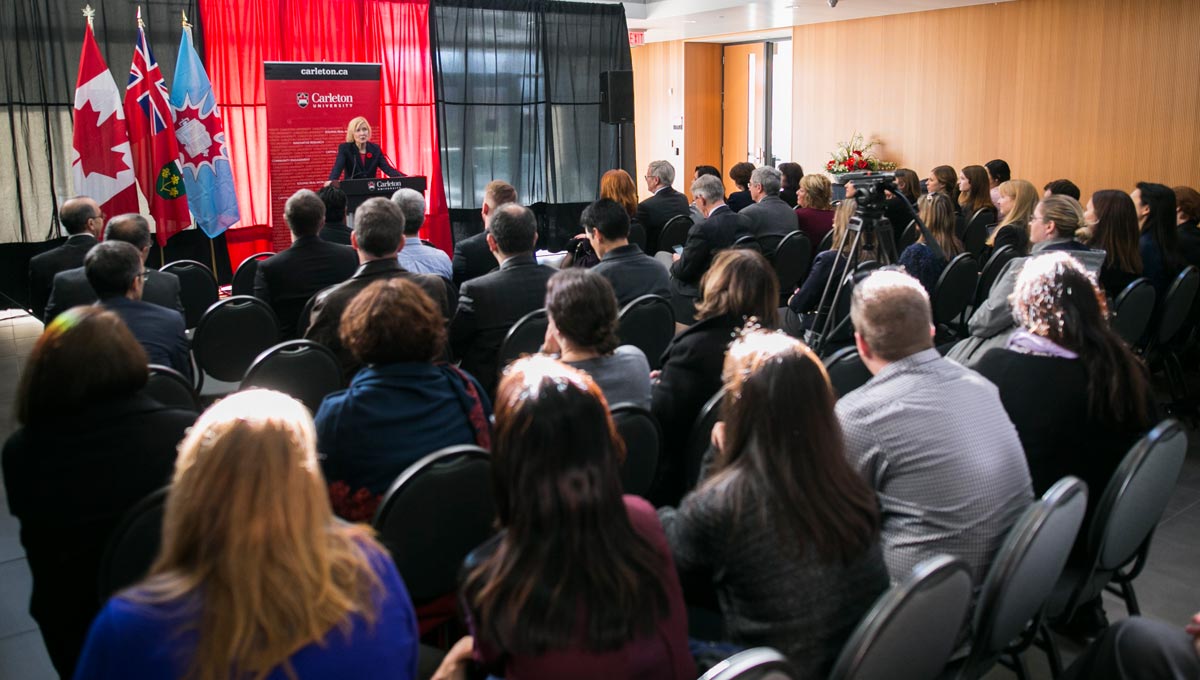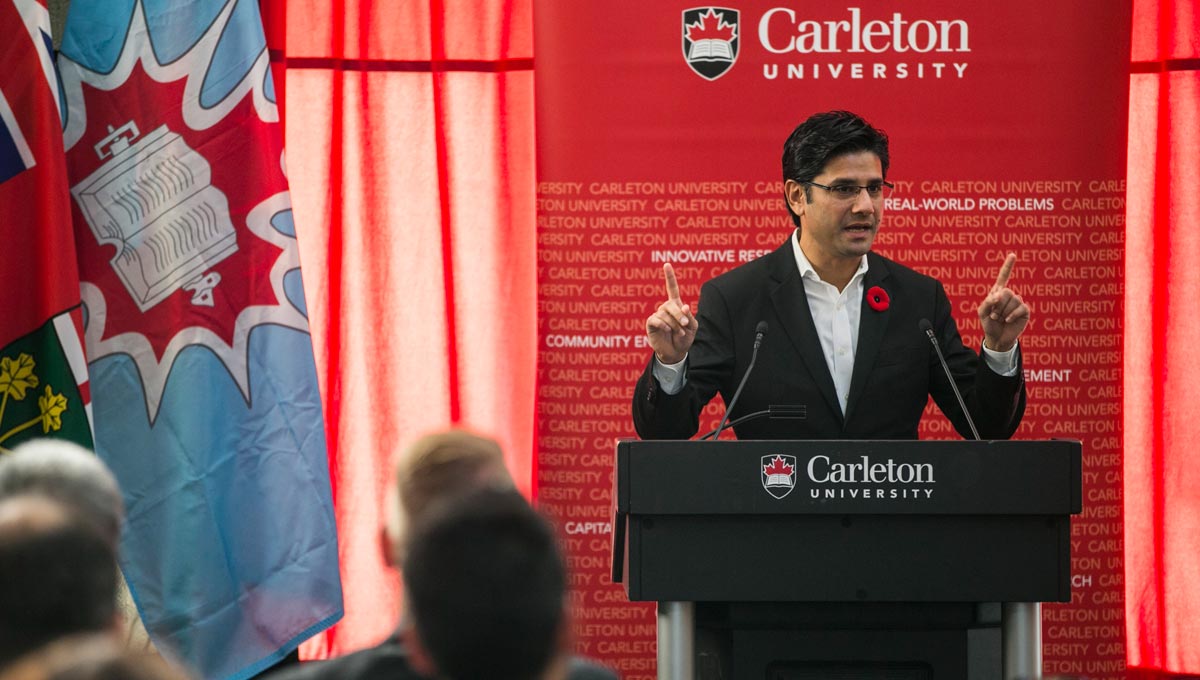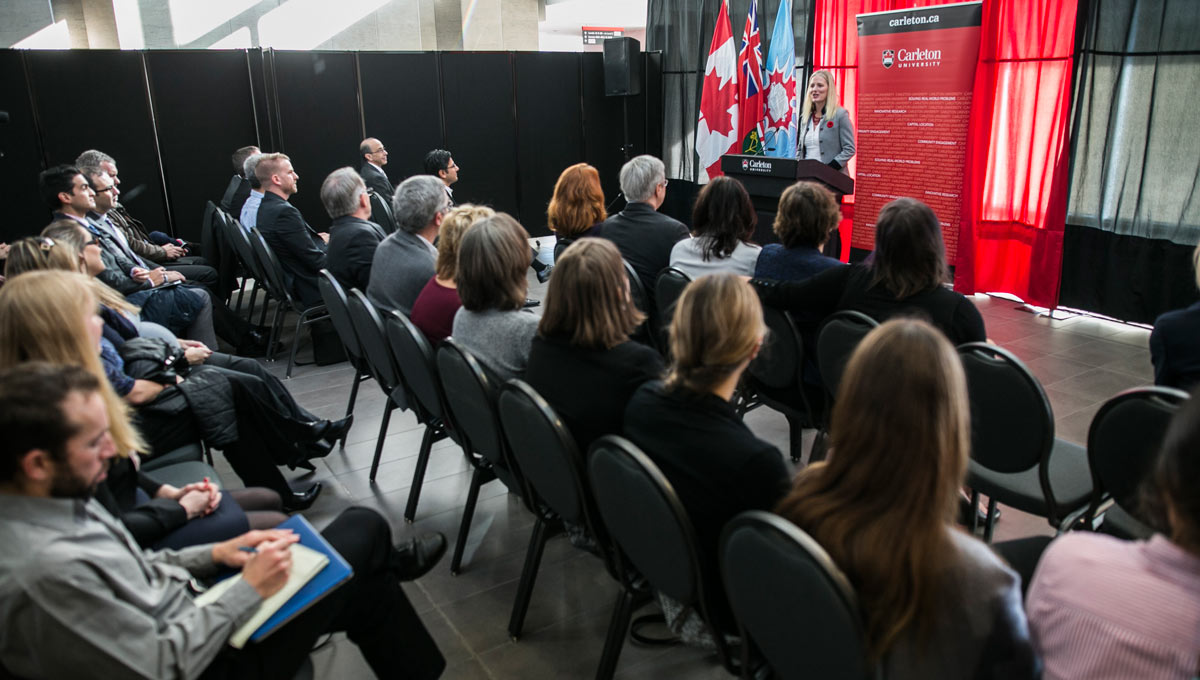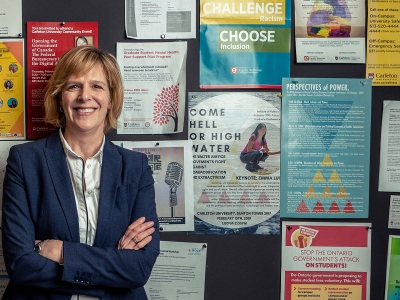By Dan Rubinstein
Photos by Chris Roussakis
Carleton has taken a major step toward its goal of making the campus and country more sustainable thanks to a multimillion-dollar investment from the federal and Ontario governments that will address environmental challenges immediately by reducing the university’s carbon footprint and for generations to come through education and research.
The funding — $22.5 million from the federal government, $3.9 million from the province and an additional $23.5 from Carleton for a total investment of $49.9 million — will support energy efficiency retrofitting at the university and the creation of a new Institute for Advanced Research and Innovation in Smart Environments (ARISE) to bolster innovation in clean technology, health technology and complementary fields.
The retrofitting and modernizing work will include an upgrade to the Faculty of Engineering and Design’s Sustainable Energy Research Facility, the installation of LED lighting across campus, upgraded boilers and energy control systems, and the creation of a Research Observatory Centre at an expanded central heating plant.
The new funding will allow core elements of these changes to be completed in two rather than six years. Overall, the improvements will reduce Carleton’s energy consumption and carbon footprint by up to eight per cent — the equivalent of taking nearly 800 cars off the road for a year — and help Canada become a world leader in building performance and engineering.

Cutting our Carbon Footprint while Boosting Research Opportunities

Catherine McKenna, Canada’s minister of Environment and Climate Change
“I am delighted to see that these new buildings will be energy efficient and provide research opportunities in environmental and climate science — a key field of research as Canada continues to take real action and find practical solutions to tackle climate change,” said Catherine McKenna, Canada’s minister of Environment and Climate Change and the “local” Ottawa Centre MP. She announced the funding on Nov. 7 at Carleton’s Richcraft Hall, along with Ontario Attorney General Yasir Naqvi, on behalf of federal Minister of Innovation, Science and Economic Development Navdeep Bains.
“We’re so fortunate to have this great institution in our community contributing valuable research and ideas,” added McKenna. “[Carleton] is doing amazing work tackling the most pressing challenges of our day.”
“We know that providing access to high-quality education and modern training facilities is critical to building the highly-skilled workforce we need to support good jobs and economic growth,” said Naqvi, a Carleton alumnus who earned a master’s degree in International Affairs at the university. “We’re also making sure we’re reducing our greenhouse gas footprint at the same time and enhancing an amazing place to learn.”

Retrofitting to Fight Climate Change
Considering that buildings account for more than half of the country’s electricity use and roughly 30 per cent of Canada’s greenhouse gas emissions, retrofits like the work at Carleton represent an important front in the fight against climate change and cutting the carbon footprint. These changes are also an integral part of the university’s Energy Master Plan, which prioritizes reducing energy and water use across campus.
The ARISE project has a long-term focus. By renovating 23,000 square feet inside the university’s Life Sciences Research Building and adding an additional 34,500 square feet, Carleton will establish an institute that will focus on applied research in pursuit of innovation and commercialization opportunities in clean technology, health technology and information and communication technology.
Researchers from the faculties of Science, Engineering and Design, Business, Public Affairs and Arts and Social Sciences will collaborate and train students to do research on smart environments embedded seamlessly with sensors to maximize efficiency and help reduce energy conservation. The institute will also feature a space for start-up incubation and facilitate interactions with industry.
“This strategic investment furthers Carleton’s leadership in green technology, digital communications, big data and cybersecurity research,” said Carleton President Roseann O’Reilly Runte. “We have made great strides in these fields and we are committed to leading the way in the future, both in Canada and abroad.”

A Living Laboratory Arises

Rafik Goubran, Carleton’s acting Vice-President (Research and International)
ARISE “will become a true living laboratory that will allow students to obtain marketable skills and become entrepreneurs,” said Rafik Goubran, Carleton’s acting Vice-President (Research and International). “We will be supporting their start-ups and facilitating their interactions with small and medium-sized enterprises, as well as global multinational firms.”
Moreover, the integration of Internet-of-things technologies and data analytics with water and energy conservation research will lead to a cross-pollination of ideas that will produce social, economic and environmental benefits.
“These areas of research really play to Carleton’s strengths,” said Goubran. “And by locating these programs together, we’ll be able to take advantage of the next generation of technologies that will create new markets and networks.
“At Carleton, we want to help improve the social, economic and environmental health of all Canadians. With this investment, we are firmly on that path.”
The federal government funding is part of Canada’s Innovation Agenda, which aims to make the country a global centre for innovation — one that creates jobs, drives growth across all industries and improves the lives of all Canadians.
In total, this round of funding will see universities and colleges throughout Ontario receive more than $1.9 billion from the Government of Canada, the province, the institutions themselves and private donors. The federal support is being allocated through the Post-Secondary Institutions Strategic Investment Fund, which has a mandate to enhance and modernize research facilities on Canadian campuses, cutting the carbon footprint and improving the environmental sustainability of these facilities.
This funding, said McKenna, “will jumpstart a virtuous circle of innovation that will create benefits for generations to come.”

Monday, November 7, 2016 in Environment and Sustainability, Innovation, Research
Share: Twitter, Facebook



